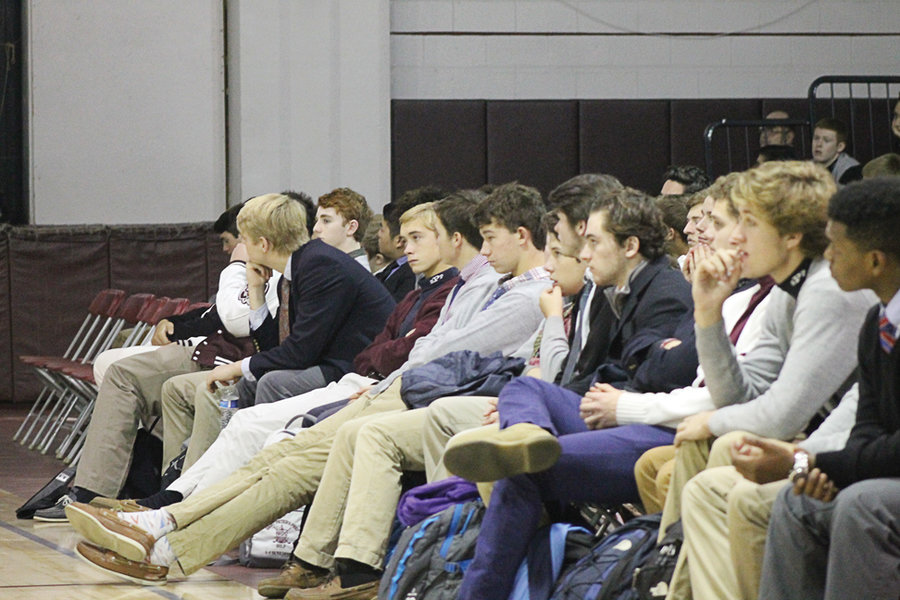Camp Four is not a place people usually spend the night. It is the last place where people pause before making their last push to reach the summit of Mount Everest. But the wind storm and other conditions were so bad when Colin O’Brady got there last May, he and his team had to stop.
Climbing Mount Everest is one of the stops on the Explorers Grand Slam, an adventure challenge to climb the Seven Summits – the highest mountains on each of the seven continents – and reach the North and South Poles on skis.
O’Brady took up the challenge in order to raise $1 million to combat childhood obesity through his Beyond 7/2 Project, a non-profit founded by the American Heart Association and the Clinton Foundation.
Speaking before students at St. Peter’s Prep in Jersey City, O’Brady talked about his rise to the top of this and other peaks, and the story of how he overcame a 2008 accident during a backpacking trip around the world in which he suffered second and third degree burns to 22 percent of his body. He was told he might never walk again.
“I was determined to beat the odds and get out of that wheelchair,” he told the students.
After the accident, he moved to Chicago and became a commodities trader, spending the next year to recover. In 2009, he won the sprint portion of a triathlon, followed by a number of races, eventually earning a position on Team USA at the 101 World Triathlon Championships in Budapest, after which he became a professional athlete.
Taking the challenge
In 2012, he read “Climbing the Seven Summits,” by his manager and wife, Jenna Besaw, and learned about the Explorers Grand Slam, which only 42 people have ever completed, and only four of them in under a year.
O’Brady grew up in Oregon, so he was no stranger to mountain climbing. He had climbed mountains with his father as a child. He figured he could use the challenge as a fundraising tool for Beyond 7/2, a not for profit designed to empower kids to develop life long, healthy eating habits. His dream, he said, was to inspire kids and adults to live active and healthy lives.
On Christmas Day, 2015, he flew to Chile for the first leg of the trip to Antarctica, beginning the adventure officially on Jan. 4. From the South Pole, he went on to climb Mount Vinson in Antarctica, Aconcagua in South American, Carstensz in Oceania, Mouth Kilimanjaro in Africa, Mount Elbrus in Europe, and then to the North Pole on April 19.
So when he approached Mt. Everest in May of this year, he was already weary. While other people had climbed Mt. Everest before him, none had done so during the previous two years.
“The way up was crowded with people trying to get to the top,” he said. “And I had a bad feeling that tragedy would happen during those attempts.”
And he, unfortunately, was proven right.
“People died during that climb,” he said. “Not any of us, but others.”
“When I was in that wheelchair, I envisioned myself taking the first step.” – Colin O’Brady
____________
“We’ll go for fifteen minutes and see what happens,” he said.
But he didn’t climb the path with the others. They took an already established route to one side. It was difficult, yet they avoided a possible accident involving other climbers.
Weary from the rapid succession of climbs, he said, pushing on was a matter of endurance and determination.
The first 15 minutes led another, and then another, until finally they reached the top.
Brady went on to Alaska, to climb the summit of Denali, setting a world record for completing the Explorers Grand Slam in 139 days.
Later, when asked about how he felt standing at the top of one of the highest peaks in the world, he admitted that he felt some sense of spirituality, small but in a good way, as if he was part of something much bigger than he was.
One step at a time
Holding up a pebble he took from Mount Everest, O’Brady told the students he carries it around with him to remind himself that accomplishments often involve doing things a little at a time, climbing a mountain one small stone at a time.
He told students that they need to set goals in life and work towards them. He asked them to close their eyes and envision a goal, maybe not athletics, but perhaps going to college and then moving towards that goals.
“When I was in that wheelchair, I envisioned myself taking the first step,” he said, noting that he struggled against the negative voices inside himself. “It’s about taking one step at a time.”
Al Sullivan may be reached at asullivan@hudsonreporter.com.
